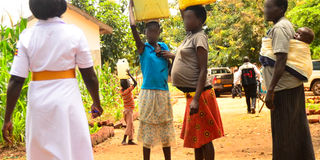Prime
Lango leaders ask parents to join fight against teenage pregnancies

Pregnant teenagers from a well in Palabek Ogili Village, Lamwo District, in 2020. Economic empowerment is important in reducing the risk of early marriages and increasing the likelihood of staying in school. PHOTO/FILE
What you need to know:
- Economic empowerment is important in reducing the risk of early marriages and increasing the likelihood of staying in school.
- Mr. David Odongo, the L C 5 chairperson, Alebtong, urged parents to initiate open conversations with teenagers, specifically addressing topics such as sex and the use of contraceptives.
Lango sub-region leaders have asked parents to actively participate in the battle against teenage pregnancies, which have become increasingly prevalent in the area.
While having a discussion to commemorate World Population Day in Alebtong district on July 11, several leaders and stakeholders emphasised that parents should play a crucial role in shaping the lives of their children by providing guidance and comprehensive sex education.
Mr. David Odongo, the L C 5 chairperson, Alebtong, urged parents to initiate open conversations with teenagers, specifically addressing topics such as sex and the use of contraceptives.
"We must not shy away from discussing these topics, as ignorance has led many families into trouble when our children become pregnant. Let us take advantage of the opportunities provided by the government, such as UPE and USE, to keep our girl child in school and prevent early marriages," Mr. Odongo remarked.
In Uganda, statistics reveal that 64 percent of girls engage in sexual activity before the age of 18, and 34 percent get married before reaching 18 years old. On average, there are 1,000 teenage pregnancies recorded daily in Uganda, with Lango sub-region accounting for 28 percent of these cases.
A recent report by the National Population Council indicates that Oyam district has the highest number of teenage pregnancies, with 4,448 cases, followed by Lira with 3,871, Kole district with 3,186, Dokolo with 2,363, Kwania with 2,332, and Alebtong with 2,190 teenage pregnancies.
Mr. Benard Abenaitwe, the Chief Administrative Officer of Alebtong district said the high poverty rates in the region have contributed to increased teenage pregnancies and school dropouts.
"Since 2020, we have conducted various campaigns to raise awareness among parents and communities about the dangers of teenage pregnancies. The government should continue investing in programs that equip young people with vocational and entrepreneurial skills," Mr. Abenaitwe stated.
He further emphasised the importance of economic empowerment in reducing the risk of early marriages and increasing the likelihood of staying in school.
Mr. Abenaitwe urged young people to make use of their youth when they have fewer responsibilities.
Uganda's Demographic and Health Survey in 2016 reported an annual population growth rate of 3.0 percent, highlighting the significance of addressing this issue.
Mr. Jotham Musinguzi, the Director General of the National Population Council (NPC), called on young people to raise awareness about the consequences of teenage pregnancies, child marriages, and school dropouts.
He said the parent ought to know the importance of advocating for comprehensive sexuality education, reproductive health services, and legal reforms to protect young people.
Dr. Mary Otieno, the UNFPA Uganda Country Representative said one in three girls in Lango region either has a child or becomes pregnant by the age of 18.
In 2021, the region witnessed a surge in teenage pregnancies, rising from 28,780 in 2020 to 33,307 cases.
Against this backdrop, Ms. Otieno urged parents to ensure their children receive at least 11 years of education, particularly girls.
"Keeping girls in school is a high-impact intervention that has proven effective in many countries. It is essential to keep girls in school and delay childbearing to enable Uganda to harness the opportunities offered by its young population and achieve middle-income status," Ms. Otieno emphasised.
According to the National Council Uganda’s population has managed to grow from 14 million people, in 1986 to 48 million people, now. Life expectancy has also risen from 43 years in 1986 to 64 years.






